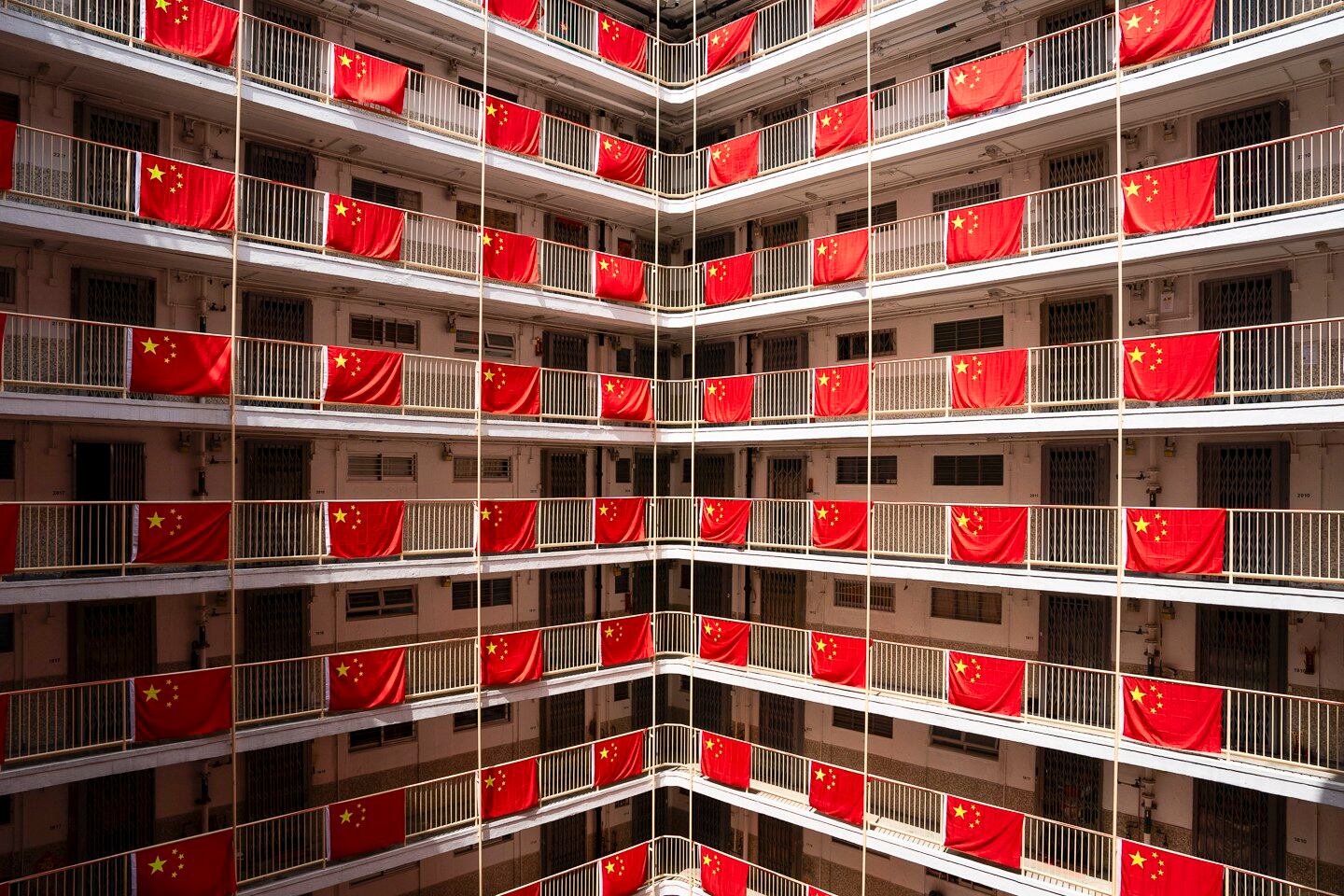President Xi Jinping marked the 75th anniversary of the People's Republic of China on Tuesday with a glowing review of the Communist Party's achievements since late supreme leader Mao Zedong founded the country on Oct. 1, 1949.
Some 120,000 people gathered to sing the national anthem in Tiananmen Square, where Xi described the founding of communist China as "a watershed moment in the 5,000-year history of Chinese civilization," the Xinhua agency reported.
"Doves and balloons were released, and tears glistened in many eyes," it gushed.
But the day held a very different meaning for Uyghurs, Tibetans and Hong Kongers who have felt Beijing’s iron grip in their lives and societies. Many held protests in cities around the world.
“Oct. 1 is the day when the Chinese communists invaded our homeland East Turkestan," Qelbinur Sidiq, who taught at a Uyghur concentration camp in China, said at a protest in The Hague, the Netherlands, on Saturday.
"While they celebrate this as a national holiday, Uyghurs mark the day as the 75th anniversary of their occupation," he said. "For Uyghurs, it is a day of mourning."
Tibetans
[ Read coverage of this story in TibetanOpens in new window ]
Across Tibet, Chinese authorities stepped up surveillance of residents, along with a program of political indoctrination and enforced National Day celebrations in Tibetan monasteries and schools, as part of Xi's "National Unity" policies that erase local cultures and customs in favor of displays of Chinese culture approved by the Communist Party.
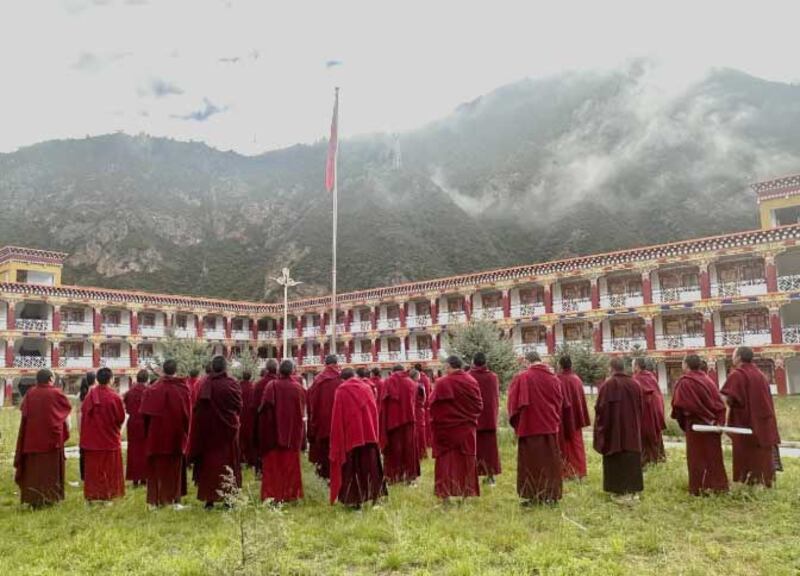
Tibetan students in Lhasa, Ngaba prefecture and the Derge region of Sichuan province were forced to take part in military drills, wearing uniforms and shouting patriotic slogans.
Police checked the ID of anyone entering the regional capital Lhasa, where residents are being ordered to display banners wishing "Happy Birthday" to the ruling party.
Buddhist monks are being forced to take part in speaking contests in Mandarin, while monasteries must fly the national flag at all times to affirm "national unity and stability," residents told RFA Tibetan in recent interviews.
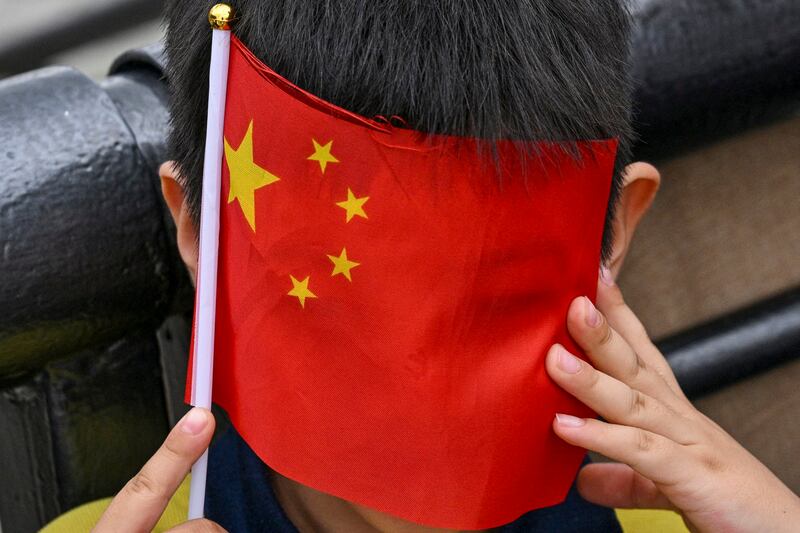
"The Chinese Communist Party is intensifying 'patriotic education' in Tibetan monastic schools as part of the National Day celebrations," a person familiar with the situation told Radio Free Asia. "Schoolchildren are being forced to participate in military drills and political education, focusing on themes of national unity and ethnic harmony."
The moves came as Xi also called for more widespread use of Mandarin in ethnic minority regions of China, along with greater efforts to educate young people about Chinese history and culture.
Uyghurs
[ Read coverage of this story in UyghurOpens in new window ]
Uyghurs outside of China held rallies and protests in the run-up to the National Day holiday in the United States, Canada, Australia, Japan, Turkey and European capitals.
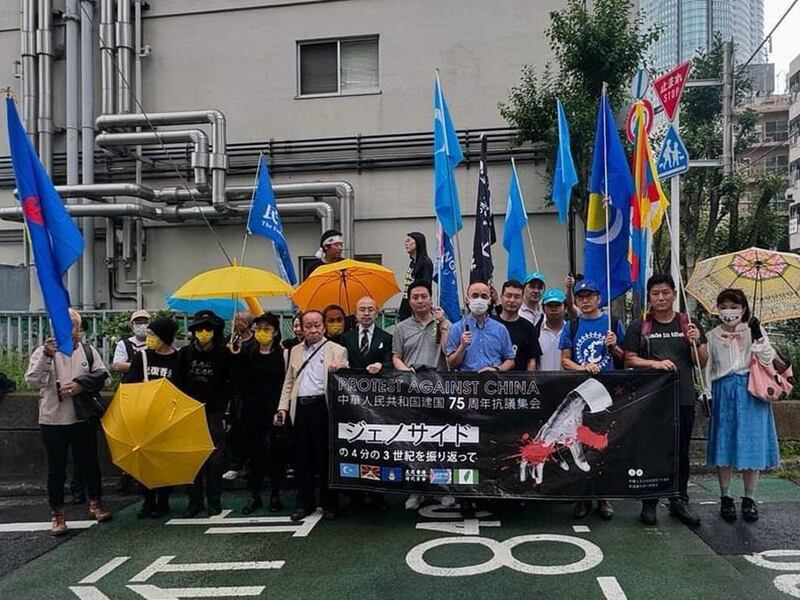
"Today marks an important moment to stand united against the People's Republic of China and its brutal repression of our fundamental human rights," World Uyghur Congress Interim President Erkin Ekrem said in a statement.
"For the past 75 years, China has maintained a brutal regime that systematically violates the rights of millions, eroding our cultural and religious identity and silencing dissent," he said.
The group called for solidarity with Uyghurs, Hong Kongers, Tibetans, and ethnic Mongolians, who it said are facing varying degrees of "genocide, transnational repression, cultural assimilation, and religious persecution."
During a National Day celebration at the Chinese Embassy in London, Chinese dressed in Uyghur outfits performed a Uyghur dance in front of invited officials and guests – generating a backlash from Uyghur advocates.
Luke de Pulford, executive director of the Inter-parliamentary Alliance on China criticized it as "blatant insult" to Uyghurs on X. "The Chinese Embassy, by putting on a dance like that, which was deeply offensive to Uyghurs, was testing the water to see what the new U.K. government's response would be," he told RFA Uyghur.
Hong Kong
[ Read coverage of this story in CantoneseOpens in new window ]
Authorities in the former British colony have gone all out to boost tourism and consumer spending over the National Day holiday, covering the downtown area in celebratory national flags and rolling out more than 400 attractions and promotions.
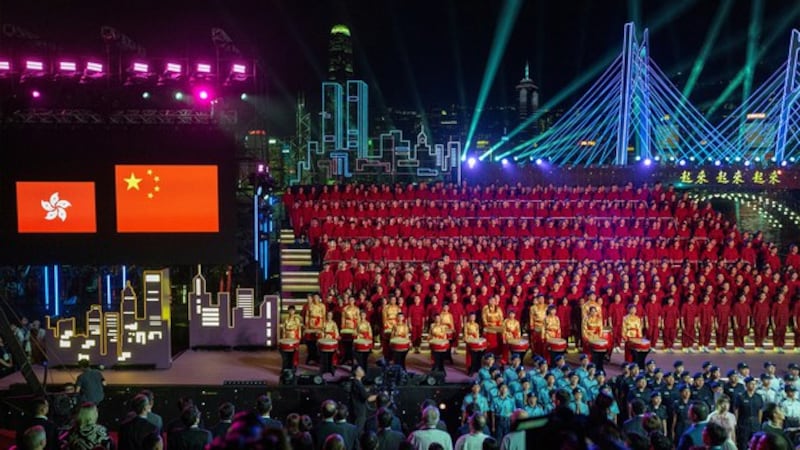
They included half-price movie tickets, discounts on transportation and dining, as well as a drone and fireworks show over the city's iconic Victoria Harbour.
But while dignitaries assembled in Bauhinia Square for the usual formal flag-raising and anthem ceremony, complete with goose-stepping guards, not everyone was catching the festive mood.
"I don't really know much about these activities apart from the fireworks, which we have every year," a Hong Kong resident who gave only the surname Cheung for fear of reprisals told RFA Cantonese. "There wasn't enough publicity about them, and they're not really worth mentioning."
"It's always good to get a discount, but I don't really want to spend anything, and there's not much of an atmosphere of celebration," he said, as the city's police force posted photos of armored vehicles on Facebook and said it would deploy some 7,000 officers to maintain public order.
Exiled former pro-democracy lawmaker Ted Hui said the first National Day after the passage of the latest Article 23 security legislation should be a "day of anger" for the people of Hong Kong.
"The Hong Kong government has dispatched large numbers of officers and armored vehicles, proving that they know deep down that everyone is angry," Hui said. "They say it's a celebration, but the police presence makes it look more like martial law."
Taiwan
[ Read coverage of this story in CantoneseOpens in new window ]
In democratic Taiwan, Hong Kongers who fled a political crackdown in their home city held a small protest on Tuesday, to "counter the lies of the Hong Kong government," exiled Hong Konger Fu Tong told Radio Free Asia.
"Oct. 1 is a day of sadness for us Hong Kongers," Fu said, citing the 2019 shooting of a teenage protester by a police officer at the height of the protest movement. "The government doesn't want us to talk about these things."
He accused the government of covering up official involvement in the July 21, 2019, attacks on train passengers and bystanders in Yuen Long MTR station, by unidentified white-clad thugs wielding sticks.
"Those of us who are overseas have to pass on our true history, and speak out for those in Hong Kong who can't speak for themselves," Fu said.
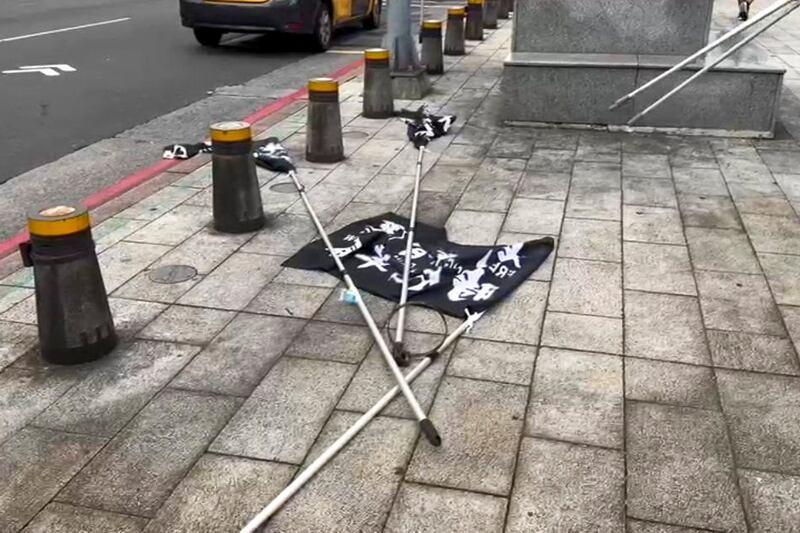
And at a protest by Hong Kongers in Taipei, a scuffle broke out as two men and a woman wrestled away a flag from protesters that bore the banned slogan, "Free Hong Kong, Revolution Now!"
"Today is China's National Day," the man told one of the Hong Kongers, when challenged. "I won't allow such things."
The trio were escorted away from the scene by police officers, with one man shouting: "Hong Kong is part of China, OK?" while a protester yelled back: "Taiwan belongs to the Taiwanese people, and Hong Kong belongs to the Hong Kong people."
Translated by Luisetta Mudie, Alim Seytoff and Tenzin Dickyi. Edited by Luisetta Mudie and Malcolm Foster.

